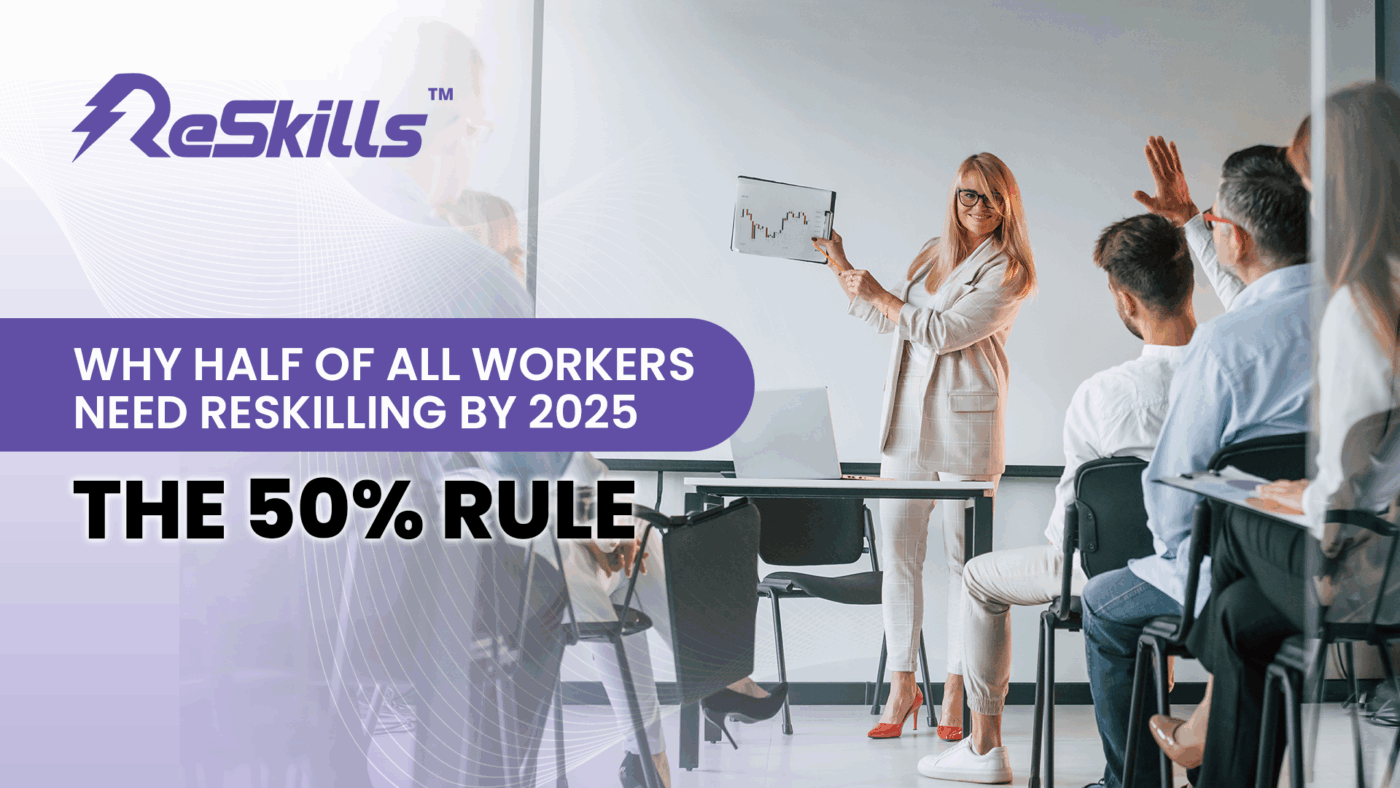The workplace is undergoing its most dramatic transformation in decades. According to the World Economic Forum’s latest research, 50% of all employees will need reskilling by 2025 as technology adoption accelerates across industries. This isn’t just another statistic—it’s a wake-up call that demands immediate action from both workers and employers.
The Urgent Reality of Workforce Transformation
The pace of technological change has reached a tipping point. Artificial intelligence, automation, and digital transformation are reshaping job roles faster than many professionals can adapt. What worked five years ago may not be relevant today, and what’s relevant today might be obsolete tomorrow.
The numbers paint a clear picture: companies are recognising that their survival depends on having a skilled workforce that can navigate this new landscape. A recent survey reveals that 85% of employers now prioritise upskilling their existing workforce over external hiring. This shift represents a fundamental change in how organisations approach talent development and career advancement.
Understanding the Skills Gap Crisis
The skills gap isn’t just about technology—it’s about the intersection of human capabilities and digital innovation. Today’s professionals need to master both technical competencies and uniquely human skills that complement AI systems.
Current State of Skills Demand
| Skill Category | Growth Rate 2024-2025 | Industry Impact |
| AI Literacy | 340% | All sectors |
| Data Analysis | 280% | Business, Healthcare, Finance |
| Digital Communication | 210% | Remote work, Customer service |
| Creative Problem-Solving | 190% | Strategy, Innovation |
| Emotional Intelligence | 165% | Leadership, Team management |
The challenge extends beyond individual career development. Organisations are discovering that investing in employee growth through structured online study programs yields better results than constantly recruiting new talent. This approach not only reduces hiring costs but also builds loyalty and creates a more adaptable workforce.
AI Skills That Will Define Career Success
As artificial intelligence becomes increasingly embedded in daily business operations, professionals who can work effectively alongside AI systems will have a significant advantage. The key isn’t to compete with AI but to learn how to leverage it effectively.
Essential AI Competencies for 2025
Prompt Engineering: The ability to communicate effectively with AI systems has become as important as any traditional communication skill. Professionals who master prompt engineering can increase their productivity by 40-60% across various tasks.
AI Tool Integration: Understanding how to incorporate AI-powered solutions into existing workflows transforms routine work into strategic activities. This includes everything from automated data analysis to AI-assisted content creation.
Machine Learning Basics: While not everyone needs to become a data scientist, understanding fundamental ML concepts helps professionals make better decisions about when and how to apply AI solutions.
Ethical AI Usage: As AI becomes more prevalent, knowing how to use these tools responsibly and understanding their limitations becomes crucial for maintaining professional credibility.
Industry-Specific AI Applications
Different sectors require tailored approaches to AI integration. Marketing professionals might focus on AI-driven customer insights, while healthcare workers need to understand AI diagnostic tools. The key is identifying which AI applications provide the most value in your specific field.
The Internal Development Revolution
The traditional model of external hiring is giving way to internal talent development. Smart organisations recognise that investing in their current employees’ personal development creates more value than constantly searching for external candidates.
This shift creates unprecedented opportunities for career advancement through strategic upskilling. Employees who proactively develop relevant skills often find themselves fast-tracked for promotions and new responsibilities.

Benefits of Internal Upskilling Programs
Organisations that prioritise internal development report several key advantages:
- Reduced Recruitment Costs: Training existing employees costs significantly less than hiring externally
- Improved Employee Retention: Workers who receive development opportunities are 94% more likely to stay with their current employer
- Faster Implementation: Current employees already understand the company culture and processes
- Enhanced Innovation: Diverse skill combinations within existing teams spark creative solutions
Building Your Future-Ready Skill Portfolio
Success in the evolving job market requires a strategic approach to skill development. Rather than randomly pursuing every available course, professionals need to create focused learning paths that align with industry trends and personal career goals.
The Strategic Learning Framework
Assessment Phase: Begin by honestly evaluating your current skills against market demands. Identify gaps that could impact your career trajectory within the next 2-3 years.
Prioritisation: Focus on skills that offer the highest impact for your specific industry and role. Consider both immediate needs and long-term career aspirations.
Implementation: Choose learning methods that fit your schedule and learning style. Online study platforms offer flexibility that traditional classroom settings cannot match.
Application: Actively seek opportunities to apply new skills in your current role. This reinforces learning and demonstrates value to employers.
Iteration: Regularly reassess and adjust your learning plan as market conditions and personal goals evolve.
High-Impact Learning Strategies
The most successful professionals combine multiple learning approaches to maximise retention and application. This might include online courses, peer learning groups, mentorship relationships, and hands-on projects.
Microlearning: Break complex skills into manageable chunks that can be mastered in 15-30 minute sessions. This approach fits busy schedules while maintaining consistent progress.
Project-Based Learning: Apply new skills to real workplace challenges. This creates immediate value while reinforcing theoretical knowledge through practical application.
Community Learning: Join professional groups and online communities where you can learn from peers facing similar challenges.
Overcoming Common Upskilling Barriers
Many professionals recognise the need for skill development but struggle with implementation. Time constraints, information overload, and lack of clear direction are common obstacles that prevent career advancement.
Time Management Solutions
The biggest barrier to professional development is often finding time for learning. Successful professionals integrate learning into their daily routines rather than treating it as a separate activity.
During Commutes: Use travel time for educational podcasts or mobile learning apps
Lunch Breaks: Dedicate 20-30 minutes daily to focused skill development
Weekend Mornings: Reserve 2-3 hours weekly for deeper learning projects
Work Integration: Look for opportunities to learn while completing regular tasks

Information Filtering Techniques
The abundance of learning resources can be overwhelming. Focus on quality over quantity by selecting programs that offer structured pathways and measurable outcomes.
Research-backed learning platforms provide curated content that eliminates guesswork and ensures you’re developing skills that truly matter in today’s market.
The ROI of Strategic Upskilling
Investing in skill development yields measurable returns that extend far beyond salary increases. Professionals who commit to continuous learning report higher job satisfaction, increased confidence, and better work-life balance.
Quantifiable Career Benefits
| Investment Area | Average ROI Timeline | Career Impact |
| Technical Skills | 6-12 months | 15-25% salary increase |
| Leadership Development | 12-18 months | Promotion opportunities |
| Industry Certifications | 3-6 months | Enhanced credibility |
| Soft Skills Training | 6-12 months | Improved team dynamics |
The most successful professionals view upskilling as an ongoing investment rather than a one-time expense. This mindset shift transforms learning from a burden into a competitive advantage.
Creating Your 2025 Action Plan
The time for passive career management has passed. Professionals who thrive in the coming years will be those who take proactive control of their skill development and career trajectory.
Start by identifying three skills that would have the most immediate impact on your current role. Then, create a 90-day learning plan that includes specific milestones and application opportunities.
Remember that the goal isn’t to become an expert in everything but to develop a strategic combination of skills that makes you indispensable in your chosen field.
Your Next Step Toward Career Transformation
The 50% reskilling reality isn’t a distant threat—it’s happening now. While this creates challenges, it also presents unprecedented opportunities for professionals who are prepared to adapt and grow.
The question isn’t whether you need to upskill; it’s whether you’ll take action before your competitors do. Every day you delay is a day your peers are gaining advantages that could define the next decade of your career.
Ready to future-proof your career with strategic upskilling? Discover how thousands of professionals are already transforming their careers through proven online learning pathways. Visit ReSkills to explore personalised development programs designed for busy professionals who refuse to be left behind in the AI revolution. Your future self will thank you for the action you take today!




